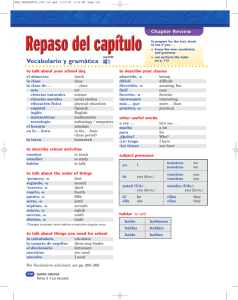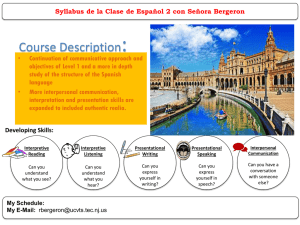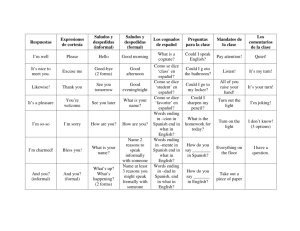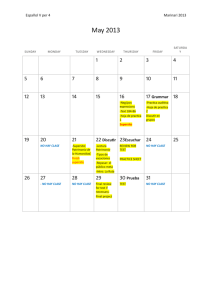CLASE Notes The First Triennial Conference on Latino a Success!
advertisement
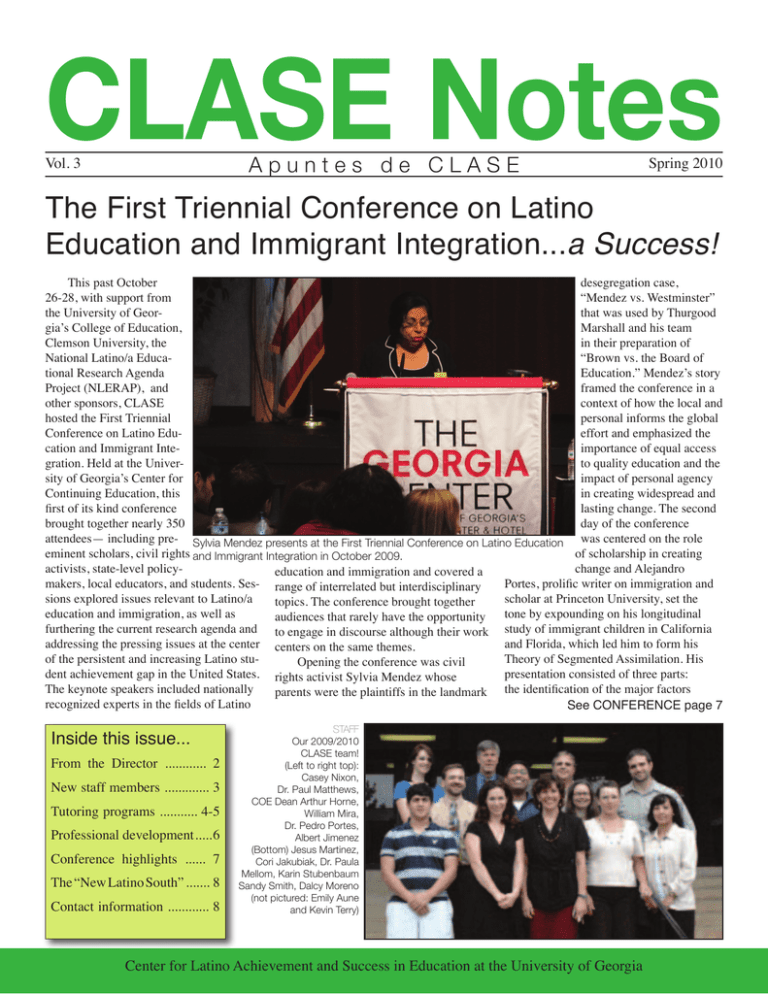
CLASE Notes Vol. 3 Apuntes de CLASE Spring 2010 The First Triennial Conference on Latino Education and Immigrant Integration...a Success! desegregation case, Thispast October “Mendez vs. Westminster” 26-28, with support from that was used by Thurgood the University of GeorMarshall and his team gia’s College of Education, in their preparation of Clemson University, the “Brown vs. the Board of National Latino/a EducaEducation.” Mendez’s story tional Research Agenda framed the conference in a Project (NLERAP), and context of how the local and other sponsors, CLASE personal informs the global hosted the First Triennial effort and emphasized the Conference on Latino Eduimportance of equal access cation and Immigrant Inteto quality education and the gration. Held at the Univerimpact of personal agency sity of Georgia’s Center for in creating widespread and Continuing Education, this lasting change. The second first of its kind conference day of the conference brought together nearly 350 attendees— including pre- Sylvia Mendez presents at the First Triennial Conference on Latino Education was centered on the role of scholarship in creating eminent scholars, civil rights and Immigrant Integration in October 2009. change and Alejandro activists, state-level policyeducation and immigration and covered a Portes, prolific writer on immigration and makers, local educators, and students. Ses- range of interrelated but interdisciplinary sions explored issues relevant to Latino/a scholar at Princeton University, set the topics. The conference brought together education and immigration, as well as audiences that rarely have the opportunity tone by expounding on his longitudinal furthering the current research agenda and to engage in discourse although their work study of immigrant children in California addressing the pressing issues at the center centers on the same themes. and Florida, which led him to form his of the persistent and increasing Latino stuTheory of Segmented Assimilation. His Opening the conference was civil dent achievement gap in the United States. rights activist Sylvia Mendez whose presentation consisted of three parts: The keynote speakers included nationally parents were the plaintiffs in the landmark the identification of the major factors recognized experts in the fields of Latino See CONFERENCE page 7 Inside this issue... From the Director ............ 2 New staff members ............. 3 Tutoring programs ........... 4-5 Professional development ..... 6 Conference highlights ...... 7 The “New Latino South” ....... 8 Contact information ............ 8 STAFF Our 2009/2010 CLASE team! (Left to right top): Casey Nixon, Dr. Paul Matthews, COE Dean Arthur Horne, William Mira, Dr. Pedro Portes, Albert Jimenez (Bottom) Jesus Martinez, Cori Jakubiak, Dr. Paula Mellom, Karin Stubenbaum Sandy Smith, Dalcy Moreno (not pictured: Emily Aune and Kevin Terry) Center for Latino Achievement and Success in Education at the University of Georgia From the Director Pedro R. Portes CLASE has been involved in many exciting endeavors since our last newsletter. An event that garnered national attention for the center was our First Triennial Conference on Latino Education and Immigration Integration. After an intense year of planning, the conference took place October 26-28 on the Athens campus of the University of Georgia. Almost 350 participants from across the United States attended the conference, a number that far exceeded our expectations. Keynote speakers, together with over 40 concurrent sessions covering a broad array of Latino education and immigration issues, sparked great interest among scholars and practitioners that dedicate their work to improving the educational and professional success of Latino and immigrant youth living in the US (see cover story). The conference also coincided with the start of a dialogue between CLASE and Juan Sepulveda, the head of President Obama’s initiative on Latino education. This collaboration led CLASE to make important contributions to a Community Conversation for the White House Initiative on Educational Excellence for Hispanic Americans in Atlanta, Georgia in late 2009. In preparation for this community conversation, conference participants were asked to provide questions and suggestions concerning the improvement of Latino education in the United States as well as a much needed immigration reform that allows undocumented Latino youth access to higher education. These events have cemented CLASE as the preeminent “voice” of Latino education in Georgia as well as other regions. CLASE has continued its efforts in improving Latino education through teacher training, tutoring programs, and college bound summer camps for Latino high school students. CLASE graduate assistants Cori Jakubiak, Dalcy Moreno, and Albert Jimenez are leading our new teacher training initiative at Forsyth County Schools in Cumming, GA. In collaboration with the National Education Association (NEA), CLASE is training several high school teachers in the adaptation of the Five Standards Pedagogy, developed by the University of California Berkeley’s Center for Research on Education, Diversity and Excellence (CREDE), for secondary level education. This training is the first phase in the process of developing a new set of modules specifically designed for promoting teacher quality at the high school level. CLASE’s intent is to impact educational outcomes by investing in teacher quality through evidence-based professional development. At the local level, CLASE continues to organize and evaluate the tutoring and mentoring of hundreds of elementary school students placed at risk in Athens, Georgia. Our tutoring initiative was led by our graduate assistants Dalcy Moreno, Karin Stubenbaum, William Mira, and Kevin 2 Terry. In addition to continuing our active management of programs at Oglethorpe Elementary and the support of programs at Chase Street Elementary, J.J. Harris Elementary, Garnet Ridge Boys and Girls Club, Pinewoods Library, and Oasis Católico, CLASE initiated a new after school tutoring program at Whitehead Elementary in fall of 2009. Data from endof-semester questionnaires of the tutees at four elementary school venues show that the children find the tutoring beneficial and enjoyable. Collaborative assessment with the local school district is underway to assess the programs’ impact on student grades and test scores. CLASE has also sought to provide academic support for Latino high school students in order to increase the numbers of Latinos that pursue higher education. Dr. Paula Mellom directs CLASE’s revamped “Steps to College” program, a summer science enrichment program for English Language Learners in Georgia high schools. Under its new name, “Summer Academy for Language, Science and Aspirations – SALSA”, Dr. Mellom, together with our graduate assistants Cori Jakubiak, Dalcy Moreno, and Kevin Terry, as well as several undergraduate Latino students, conducted this highly successful program with rising 9th and 10th graders from schools in Athens, Georgia in 2009. This summer, CLASE will pilot a residential SALSA program on the UGA campus to include Latino high school students outside the local school district. In addition to these main initiatives, CLASE has hosted several events that have contributed to our mission of improving the level of education of Latino students (PreK16) statewide. In February 2010, Dr. Paul Matthews, together with the UGA Department of Counseling and Human Development, organized and implemented the fifth collaborative conference for professional school counselors, “Beyond Diversity: School Counseling for Social Justice.” In March 2010, CLASE invited Dr. Richard Duran, from the University of California Santa Barbara, to speak to Latino parents about their role in developing their children’s academic potential. CLASE also hosted a public viewing of the Latino Educational Advocacy Day from California State University, San Bernardino. During this nationally broadcasted event, I had the pleasure of participating in a forum that discussed how to translate theory into action. In sum, CLASE continues to promote educational excellence, striving to dismantle group based inequality through interconnected, innovative programs. We are excited about the future of the center and our strategies to close the learning and teaching gaps not only locally, but also nationally through research and development models. CLASE Welcomes New Graduate Assistants Albert Jimenez is a doctoral student in EPIT in the Research, Evaluation, Measurement and Statistics program. For the past five years, Bert was a math teacher at Clarke Central High School, working primarily with 9th grade students. He is currently working with CLASE’s “Five Standards for Effective Pedagogy” training with Forsyth County teachers and on several data analysis projects. In addition, Bert also is a Southern Region Education Board Doctoral Scholars Fellowship recipient. Bert’s research interests lie in quality test development for all groups of students and in equal access to quality education. He is currently analyzing benchmark testing data to determine if these tests are of high quality and to see if these tests are equally effective for all groups of students. William Mira received a BA from the University of Virginia in Anthropology, and is currently an MA/ PhD student in educational psychology in the Applied Cognition and Development program. Of Salvadoran descent, William is deeply committed to issues of Latino education including the treatment of immigrant students. William’s research interests include exploring the factors that influence the overall effectiveness of tutoring/mentoring programs, specifically for Latino youth. During the spring 2010 semester, William coordinated the CLASE tutoring program at Whitehead Elementary, edited the CLASE spring newsletter, and analyzed tutor data from previous semesters. William is excited to work with CLASE to conduct research that will benefit the education of Latinos while at the same time having the opportunity to directly help his community. When William is not working he enjoys playing basketball, cooking, and reading. Lissa Clark is working on her Educational Specialist degree in Gifted and Creative Education. She is an elementary teacher who is interested in developing programs that provide culturally rich and intellectually stimulating learning environments. She is married and has three children all in elementary school. Her family moved to Athens about 5 years ago so her husband (a science teacher) could pursue a degree in Geology. Lissa has had personal life experiences that help her identify with foreign born students and their families. When she was a young child, she lived in Spain for three years and for a while attended a school that was not taught in her native tongue. As an adult, she spent 2 years living in Seoul, South Korea, where her first child was born. She especially loves working with children of immigrants (and their families). She and her husband hope to work overseas again. Jeremiah Piña is a doctoral student in the Gifted and Creative Education program and holds a bachelor’s degree in psychology from UGA. His research interests include innovating improved educational strategies for gifted and minority students, especially with concern to underrepresented populations such as Latino students. He also works part-time as an educator and gifted tutor for the Torrance Center. Though born on the Round Valley reservation in California, he has spent most of his life in and around Georgia. His interest in minority education has roots in his own minority status and the inequalities he feels are still prevalent in classrooms around the country. He views alternative, concept-based education methods, aimed not at imparting facts, but at enriching a student’s ability to think through and around problems, as vital to all students. He also believes such methods are an important potential resource for improving the education of students for whom the current system is woefully insufficient. Aside from his research interests, Jeremy immensely enjoys reading, composing various types of writing, and spending time with his family. He has an avid interest in trivia (much of which is by no means trivial), and a general interest in many things that might be considered odd, unusual, or eccentric. About CLASE The Center for Latino Achievement and Success in Education (CLASE) is an educational research and development center at the University of Georgia that provides: • professional development and resources for K-12 educators working with Latinos statewide; • outreach support through mentoring/tutoring of Latino students placed at risk; • program support in developing a pipeline to post-secondary education for Latino students; • research to inform teachers and educators on ways to reduce the achievement gap for Latino children, especially in Georgia. CLASE aims to narrow the achievement gap of Latino students placed at risk due to poverty and language barriers and to improve the level of education of Latino students (PreK-16) statewide. Its goals include: • to research and disseminate promising/best practices for Latino education; • to develop and support appropriate programs by leveraging federal, private and state funding; and • to create and enhance partnerships to raise the learning and social outcomes of Latinos in Georgia and the nation. CLASE’s first three years of operation were funded primarily by a grant from The Goizueta Founda- tion. CLASE has also received support from the Board of Regents Hispanic Task Force, the UGA Office of Public Service and Outreach, the CompuCredit Foundation, and the Title II/Improving Teacher Quality State Grants program, totaling over $600,000 of additional program funding to enhance and extend the scope of activities. In 2006, The Goizueta Foundation awarded the University of Georgia additional funds for Latino initiatives, including CLASE. 3 TUTORING Since 2003, CLASE has continuously expanded both its active and supportive role in Athens-area tutoring programs. In order to recruit tutors from the UGA undergraduate and graduate student population, CLASE collaborates with faculty and graduate assistants who teach classes that require service-learning or field experiences. In addition to this collaborative effort, CLASE launches a publicity campaign at the beginning of each semester involving distribution of flyers campus wide, advertising on UGA buses, attendance at the UGA volunteer fair, and visitation of undergraduate classes at the College of Education and beyond. To make information about CLASE tutoring programs easily accessible for UGA students and community members, all tutoring programs are listed on the CLASE tutoring web site (www.coe.uga.edu/clase/tutoring). With this widespread publicity effort, CLASE is able to attract tutors from a variety of majors outside the College of Education, such as psychology, history, law, finance, or microbiology. Many tutors actually participate in our programs in their free time because they want to support Athens-area children and contribute to their community. During the 2009-2010 academic year, CLASE once again supported the tutoring programs at Oasis Católico and the Garnet Ridge Boys and Girls Club with a paid student worker. CLASE also remained committed to the tutoring programs at the Pinewoods library through the recruitment of UGA students and has extended tutoring opportunities at several local elementary schools. Oglethorpe Avenue Elementary In fall 2009, CLASE started a tutoring program at Oglethorpe Elementary school in collaboration with Dr. Stephanie Jones, a professor of Early Childhood Education at the UGA College of Education who strongly believes in and supports the mission of CLASE. All of her 60 students are required to enroll in the Oglethorpe tutoring program, which guarantees CLASE a large number of tutors and allows for advanced program planning. Dalcy Moreno, a CLASE graduate assistant, provides training and orientation to participating tutors at the beginning of each semester to assure the quality of support tutees receive. Mrs. Moreno coordinates and supervises the tutoring program throughout the semester with the support of two paraprofessionals. Tutors and tutees meet each Wednesday and Thursday for a one and a half hour session to develop academic skills and personal relationships. In spring 2010, 58 fourth graders benefitted from the skills and commitment of UGA student tutors. CLASE’s collaboration with Dr. Jones will continue in semesters to come, which allows students placed at risk to receive the support they need to succeed in and out of the classroom. 4 Many tutors participate in our programs in their free time because they want to support Athens area children and contribute to their community. Tutors not only offered academic support, but took on a mentoring role and established close relationships with the children they worked with. Whitehead Road Elementary In fall 2009, CLASE initiated a new tutoring program at Whitehead Road Elementary thanks to the strong support from the school’s principal and the Family Engagement Specialist. A CLASE graduate assistant coordinates and supervises this weekly program in collaboration with Whitehead Elementary school staff. Our tutees love to learn and are receptive to the extra help they get with the concepts that they may struggle with in the classroom. In spring 2010, ten tutors provided one-on-one tutoring to third and fourth graders for an hour and a half every Monday after school. Four of the tutees were of Latino origin, five African Americans and one a Non-Hispanic White student. Throughout the course of the semester the tutors at Whitehead Elementary not only offered academic support, but took on a mentoring role and established close relationships with the children they worked with. Typical tutoring sessions involved working on homework, reading, writing, and math concepts such as multiplication and division. Although the CLASE tutoring program at Whitehead is relatively small, it provides a valuable service to Whitehead Elementary students. (Left and below) Local tutors work with fourth graders. Chase Street Elementary The Chase Street Elementary tutoring program is the only program that operates during the school day, as well as after school. While tutors worked with Chase Street students outside the classroom during the first years of the program, they are now working with small groups inside the classroom, under the guidance of the classroom teacher. Teachers and administrators are very pleased with this tutoring model, as it provides students and teachers with extra support while keeping students in the classroom during regular learning activities. The Chase Street tutoring program has been very popular with UGA students. They love the school’s welcoming atmosphere and the possibility to interact with elementary school students while observing an experienced teacher at the same time. In fall 2009, 36 tutors worked with Chase Street students for a total of 350 hours. Twenty tutors were recruited through the College of Education, 12 through other departments, and 4 through the Athens community. 5 Supporting Professional Development Over 100 teachers sign up for online training in Forsyth County Our coaches at work at Forsyth In an effort to improve teacher quality, CLASE has begun a unique, three-way collaboration with the National Education Association (NEA) and Forsyth County Schools in Cumming, GA. Drawing upon research conducted by the University of California-Berkeley’s Center for Research on Education, Diversity and Excellence (CREDE), CLASE, NEA, and eight Forsyth Central High School teachers are working together to develop standards of teacher quality that promote intensive language and literacy development, higher-order thinking skills and increased academic achievement across content areas for all students at the secondary level. The program began in July 2009, when participating FCHS teachers, three CLASE graduate assistants, an NEA-supported teacher educator, and CLASE Executive Director, Dr. Pedro Portes, organized a five-day professional development seminar in Forsyth County with NEA’s Linda James. The teacher attendees not only became familiar with the culturally responsive pedagogy and practiced different facets of it in simulated classroom situations, but they also explored the ways in which a similar program might be launched in secondary classroom settings teaching diverse students. Beginning in fall 2009, FCHS teachers implemented facets of the “Five Standards” Pedagogy in their classrooms, consisting of 9-12 science, social studies, foreign language, math, and language arts classes. CLASE graduate assistants, working as peer coaches, visited Forsyth Central teachers bi-monthly to observe classes, inquire about teachers’ needs, and provide feedback on their pedagogical practices. In November 2009 and February 2010, CLASE and Forsyth teachers, in collaboration with the NEA, attended in-service workshops where they discussed using new teaching methods, watched and critiqued each other’s teaching, and reflected on the challenges of implementing the Five Standards Pedagogy. Throughout this time, both CLASE graduate assistants and Forsyth Central High School teachers have been not only impressed with the effectiveness of this form of professional development, but also excited about the unique collaborative opportunities it has offered. In illustration, three FCHS teachers and three CLASE graduate assistants co-presented at the First Triennial Conference on Latino Education and Immigrant Education in Athens last fall to an audience that included academics, teachers, and even keynote speaker and civil rights activist, Sylvia Mendez. CLASE graduate assistants are also collecting interview data from teachers as part of a mixed-methods study on the challenges in-service teachers face in implementing new pedagogical programs. Slated to continue through the 2010-2011 school year, this teacher quality project between Forsyth County Schools, CLASE, and the NEA is a promising one. Connecting teacher education scholars, in-service teachers, and national association interests, the program aims not only to chart new territory in professional learning, but also to potentially produce an on-line professional development product that secondary teachers all around and outside of Georgia can soon access. 6 CLASE supports school counselors The professional development of all K-12 educators who work with Latino and English-learning students and families, including counselors and school-based administrators, is a key element of CLASE’s outreach and its plan for reducing the achievement gap. School counselors, graduation coaches, and other important school-based personnel have found CLASE’s support for their professional development especially invaluable this year, during times of tight school budgets. Many districts have not been able to pay for school counselors to attend conferences or receive opportunities for learning how to effectively support Latino students and families, answer questions about options for undocumented, high ability students, or encourage high school graduation. Fortunately, with funding support from The Goizueta Foundation, CLASE has helped meet these needs. In November 2009, CLASE Assistant Director & Outreach Coordinator Dr. Paul Matthews and CLASE research scientist Dr. Paula Mellom presented to the Georgia College Advising Corps, responding to a request for information relating to college attendance and scholarship resources available for students who are graduating high school in Georgia but are not legal residents. CLASE investigated and presented a compilation of resources to these school-based college advisers, and has provided additional follow-up information through email requests. On February 1, 2010, CLASE Executive Director Dr. Pedro Portes presented on-site to 100 Clayton County school counselors, on understanding and addressing the achievement gap. These professional school counselors, led by Dr. Ken Sanders, Clayton Co. Coordinator of School Counseling Services, plan to continue to collaborate with CLASE on future professional development needs. Discussions are underway for a year-long, systemic effort for school counselor professional development and parent informational sessions in Clayton County for 2010-11. Dr. Matthews collaborated with the UGA Department of Counseling and Human Development Services (CHDS) to plan and implement their fifth collaborative conference for professional school counselors, held in Athens on February 19, 2010. Over 150 counselors, parent liaisons, CHDS graduate students, teachers, and school district personnel attended this year’s conference, “Beyond Diversity: School Counseling for Social Justice.” The conference featured Dr. Marc A. Grimmett of NC State University, Dr. Vivian Lee of the College Board, and numerous break-out presentations (including Dr. Portes) on topics See COUNSELORS, page 7 The conference was a springboard for discussions among national stakeholders to advance research-based policy agenda recommendations. CONFERENCE, cont. from page 1 at play, such as nationality and education level; a description of the principal barriers confronting today’s children of immigrants; and a prediction of the paths expected from the interplay of these forces. His data found three commonalities among “successful exceptions” to “selective” or “downward” assimilation: strong parental figures who preserved their culture and protected them from street life; the interest of a significant other such as a teacher who provided supervision and guidance; and involvement with programs that supported their aspirations. That same day, Angela Valenzuela, author of the oft-cited work Subtractive Schooling, and scholar at the University of TexasAustin, continued the theme of the role of scholarship in creating change but also spoke to the role of educators as advocates and their responsibility to move policy. Luis Moll, scholar and pioneer of the “funds of knowledge” concept of prioritizing students’ backgrounds and cultures in schools, closed the conference, bookending Mendez’s talk by discussing the impact of Mendez vs. Westminster on the Brown case and the role of educators, scholars and activists in impacting policy change. In addition to the keynotes, there were over 40 concurrent panel sessions with presentations from researchers, students, and teachers from across the country. Other conference activities included an onsite bookstore with texts written by conference presenters, poster sessions, concurrent roundtables, and vendor displays. At present, a selection of conference proceedings is being vetted to include in an edited volume on current issues in Latino Education and Immigration and should (Above) Alejandro Portes presents at the conference. (Below) The be forthcoming in CLASE team at the conference. the next year. The conference was also a springboard for discussions among national stakeholders to advance researchbased policy agenda recommendations. These recommendations have been submitted to the Obama Administration. CLASE has also been collaborating with the White House Initiative on Educational Excellence for Hispanic Americans in their efforts to develop scalCOUNSELORS, cont. from page 6 able strategies for addressing the including education of Latino students. CLASE achievement gap and the educagraduate assistants also helped organize and assemble tional needs of Latinos. program materials and provided on-site logistical help. CLASE provided the primary financial support Keynote sessions can be viewed as for this conference, allowing almost all participants to streaming podcasts, linked from attend at no cost. Attendees were very impressed by CLASE’s website (www.coe.uga. the quality and engaging nature of the presentations, edu/clase) and enthusiastically expressed their appreciation for CLASE’s programmatic and financial support of the event. As Dr. Matthews noted on CLASE’s behalf, “We are pleased to be able to help ensure that these key educational personnel have opportunities to learn from national, state, and university experts as well as from each other, to promote educational excellence and equity for all Georgia’s students.” 7 Shaping Aspirations, Awareness, and Academics: Pipeline Lessons from the “New Latino South” High school graduation and college attendance are critically important factors in promoting economic and social equality for immigrant, Latino, and other groups with gaps in educational and economic attainment, yet rates for such students remain low. The educational achievement gap is concurrently becoming more prevalent in parts of the country—including Southeastern states such as North Carolina and Georgia which are experiencing rapid growth in immigrant populations, primarily from Latin America and Asia. Explanations for this achievement gap reveal a complex web of contextual and individual elements. Poverty, teacher preparation, language barriers, and lack of knowledge about educational norms and requirements have been proposed as contributing factors in Georgia and elsewhere. Peer groups and social networks of students also wield substantial influence over student access to educational capital, their attitudes, and aspirations. Structural obstacles likewise inhibit the success of immigrant high school students, including the “complex system of courses and requirements” for graduation and for university eligibility. Recent calls responding to these concerns include recommendations to “provide early college awareness programs and broad support services to accelerate student learning” alongside “college planning and financial aid information” and to promote high aspirations throughout middle and high school, provide stronger academic preparation, and secure financial support for higher education. Considerations for practice for schools interested in making such improvements have also been suggested; however, there is much debate on whether or not, short-term interventions can make significant and replicable impacts. To address these questions, CLASE has been conducting a study investigating the short- and longer-term impacts of participation in a summer enrichment program on students’ post-secondary aspirations and academic preparedness and the preliminary results are quite positive. The study uses data from two seasons (2006, 2008) of 4-week summer enrichment programs for students drawn from one ethnically diverse and high-poverty high school situated in a large school district in the Atlanta, Georgia metropolitan area. Students were primarily rising sophomores, from immigrant families from Latin American (almost 90%) and Asian and South Asian backgrounds, and either currently or previously designated as ELL. Participants represented a range of academic experiences and time in the U.S., and were majority female. Study results indicate highly positive Contact information Email clase@uga.edu for general queries or to be added to our CLASE informational listserve, with updates on events, activities and opportunities related to Latino education. impacts: 1) participating students “tracked themselves up” into higher level classes; 2) had much higher graduation and test pass rates; and 3) had higher college-going rates than their demographically similar peers across the county and the state. CLASE currently is planning the fourth iteration of the SALSA (Summer Academy for Language, Science and Aspirations) and will continue to follow the progress of the participants. Ensuring support to reduce groupbased inequality in graduation and college attendance is a public policy, economic, and civil rights issue of the highest order. Academic achievement gaps for Latinos and English learners run a risk of being replicated in parts of the country such as the Southeast that are experiencing rapid growth in these populations. Of vital importance are programs that can make intelligible those policies that parents and children must follow to be on track educationally and that can motivate and inspire students to prepare for higher education in realistic and appropriate ways. In order to close the achievement gap, more students must desire to attend college; learning what programs are successful in leading to this shift in expectations and aspirations, and why, is a crucial element to achieving educational equity for all the nation’s students. Excerpted from Mellom, Matthews and Portes (2010) presented at the Annual Meeting of the American Educational Research Association. The full text of this and other recent presentations are available from CLASE’s website (www.coe.uga.edu/CLASE). 315 Aderhold Hall University of Georgia Athens GA 30602-7101 8 Phone: 706-583-5561/ 706-542-3997 Fax: 706-583-8207 Newsletter Staff: William Mira, Karin Stubenbaum
